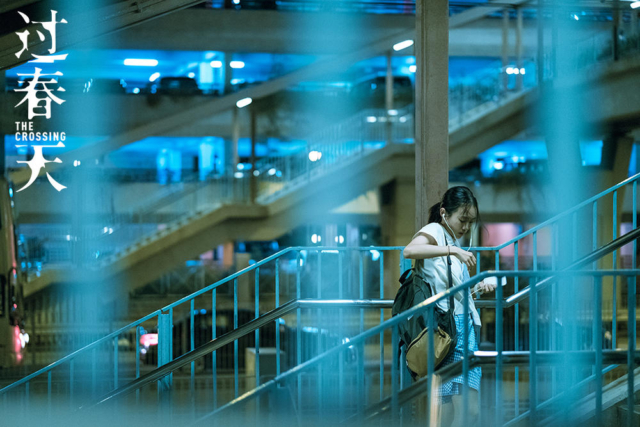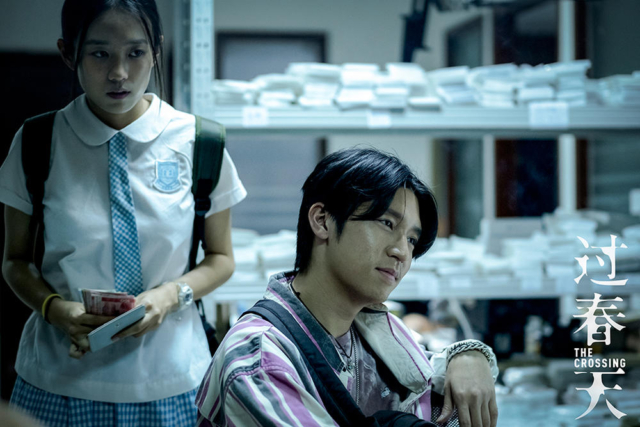21-05-19
By word of mouth, I was told the Chinese Mainland made a very special and good film The Crossing. It was made by a very gifted Mainland film director Bai Xue. The story and setting were Hong Kong, the characters were Hong Kong, the language was Hong Kong, the style was Hong Kong, few actors and crewmates were Hong Kong and the rest were all from the Mainland.
Yet, it is as impressive as any Hong Kong film made by us. Blessing or threat, this distinctive film does ring a bell to the sluggish engine of our local film industry?
Never say never. Hong Kong & Chinese Mainland used to be 2 film systems. With the inrush of film professionals to the Mainland, Mainland films especially the blockbusters have become very ‘Hong Kong’ in terms of style. As a significant step in the direction, the astonishing debut of the female director Bai Xue The Crossing poses a signal that Hong Kong films are no longer unique or superior as it can be seen, good quality ‘Hong Kong’ films can now be made by the Mainlanders who will in future create better ‘Hong Kong’ films than we do.
At a crossroad, Hong Kong must think and know which way to turn:
- Hong Kong films should be targeted at the local market only.
- Hong Kong films should be exported and targeted at the Mainland market as an expansion.
- There should not be any cultural distinction between Hong Kong and Mainland films and Hong Kong should simply work with the Mainland to produce a single kind of ‘Chinese films’.
- Forget about the Mainland market where controls are unyielding, Hong Kong films should rather be targeted at the Asian and international markets.
- Hong Kong should only be micro focused: just be the centre (center?) of co-production of Sino-foreign film joint ventures.
It is easy to say that Hong Kong must grasp all the above options. It is equally easy to opportunistically say ‘when fortune smiles, embrace her’. In one of Aesop’s Fables, a dog carrying a bone in its mouth catches sight of its reflection in a pond and snaps greedily at the bone reflected there. In doing so, the real bone slips out of its mouth and is lost. Great time is gone, all the roses falling. Hong Kong films cannot be contended with yesterday’s glory. We must search and identify a particular focus or path of survival strategy which is clever, sensible and attainable for Hong Kong.
The Crossing however took me by pleasurable surprise. What confronts me is an ‘elegantly elliptical’ film, as critic Cath Clarke pointed out, “It is a wisp of film that never quite gathers speed or force but it gets under your skin, capturing the impulsiveness and impatience of teenagers.” This good film opens the locked doors to one’s soul and is like a beautiful autumn in the meadow. No wonder why this film won numerous awards in different film festivals.
The main character Pei (Huang Yao) is a 16-year-old student who was born out of a Hong Kong-Chinese marriage in which her dad and mom separated. Her life is fractured. She lived with her mother of promiscuous relationships with men in Shenzhen of Chinese Mainland. Pei spent her every day―in school, at play or seeing her father in Hong Kong. He was a poor shipping yard worker. Her daily routine was to pass the border immigration checkpoint, take an hour train and travel between the 2 cities of Shenzhen and Hong Kong, not knowing which place was her home. She held fast to a materialistic dream: travelling to Japan and sipping sake in a hot spring with flying snowflakes surrounding her―the fantasy that she watched on TV. It was her only motivation in life and she firstly worked as a restaurant waitress. Realizing that the money would never be enough to make her dream come true, she agreed to the suggestion of her ‘dream man’ Ah Hao (Sunny Sun) who was a gangster. Wearing her school uniform as a protective shield on her daily cross-border commute, Pei became a skilled mule smuggling iPhones from Hong Kong into Chinese Mainland. More than just the money which she earned, the trafficking gave her a purpose in life―independence, confidence and warmth from the gang. Poor by character but rich by ambition, Ah Hao asked Pei to be more aggressive by betraying the gang…
A million opportunities passed away. Hong Kong is now somewhere lost: doing well in Hong Kong making ourselves a stronger city? Exploring the vast hinterland of Chinese Mainland with our limited resources? Exploring the international boundaries to strengthen Hong Kong’s global presence? Again, it is easy, if not diplomatic, to say we can bite all possibilities.
In reality, when one door opens, another usually shuts. People often encourage youngsters to go starting business or be employed in the Mainland. But how? What can they do? What backing like money, plan guidance and support have they got? All questions, when unanswered, push us back to square one…
This article can also be found at the following sites:







